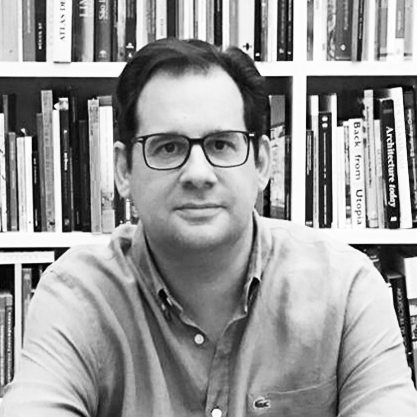Doctor Arquitecto con mención internacional (UPM, 2014) con la calificación Sobresaliente Cum Laude y Premio Extraordinario de Doctorado por la Universidad Politécnica de Madrid, Eduardo Prieto es también Licenciado en Filosofía (UNED, 2004) y DEA en Estética y Teoría de las Artes, y en Filosofía Moral y Política (UNED, 2007). Definidos por un enfoque multidisciplinar y culturalista, sus trabajos se centran en las relaciones entre el pensamiento, la técnica y la arquitectura, orientándose en varias líneas de investigación, de las cuales la más importante es la historia medioambiental de la arquitectura.
Ha sido Visiting Scholar en la Graduate School of Design de la Universidad de Harvard, ha realizado estancias de investigación en la Akademie del Bildende Künste (Viena) y la Technische Schüle Wien, y ha impartido seminarios, cursos y conferencias la EPFS Laussane, la TU Delft, Universidad Torcuato di Tella (Buenos Aires), la UNL de Santa Fe (Argentina), la Universidad Antonio de Nebrija, la Universidad Politécnica de Valencia o la Universidad Internacional de Andalucía, entre otras.
Es profesor Contratado Doctor en ejercicio y profesor Titular acreditado de Universidad, y desde 2010 trabaja en la Escuela Técnica Superior de Arquitectura de Madrid, donde actualmente imparte la asignatura de Historia de la Arquitectura y el Urbanismo en el Departamento de Composición Arquitectónica, y dirige el Curso Internacional de la UPM ‘Arquitectura medioambiental: Técnica, Tipología, Historia’ y los ‘MInicongresos de Teoría, Historia y Crítica de Arquitectura’ de la ETSAM/UPM. Fruto de esta labor docente es la dirección de diez tesis doctorales y de una veintena de tesis de máster y fin de grado, relacionadas con temas ligados al medioambiente y la energía en la arquitectura. Esta labor docente e investigadora se ha desarrollado también internacionalmente en diversos cursos de posgrado, tanto en la Graduate School of Design de la Universidad de Harvard (seminario ‘Interiors’) como en la Universidad Nacional del Litoral (‘Seminario ‘Medioambiente y arquitectura’).
Es autor de un libro pionero nacional e internacionalmente, Historia medioambiental de la arquitectura (Cátedra, 2019) —la primera en dar cuenta globalmente las relaciones de la arquitectura con la energía, la ecología, el territorio y los recursos a lo largo de la historia—, así como de otros libros relevantes en el campo de la estética de la energía: La vida de la materia (Ed. Asimétricas, 2018), La ley del reloj: arquitectura, máquinas y cultura moderna (Cátedra, 2016), La arquitectura de la ciudad global: redes, no-lugares, naturaleza (Biblioteca Nueva/Siglo XXI, 2011) y Hemiciclo solar: la energía como material de proyecto (Lampreave, 2009)—. Además, es autor de cincuenta artículos indexados y más cien recensiones de libros. Actualmente, trabaja como crítico de arquitectura para Arquitectura Viva, El Mundo / La esfera de papel, La lectura, Revista de libros y El País, entre otras publicaciones, y es miembro del comité científico o revisor científico de revistas de arquitectura de reconocido prestigio, como ZARCH, Reia, Constelaciones, Cuaderno de notas, Informes de la construcción, Cuaderno de proyectos arquitectónicos, Varia, Arquitectura y Astrágalo, entre otras.
Como arquitecto en ejercicio, es autor de edificios definidos por su impronta medioambiental, como la sede de la Agencia Andaluza de la Energía en Sevilla, el prototipo de viviendas sostenibles ‘Manubuild’ en Madrid o la sede de SEGIPSA en Ciudad Real. Por esta faceta, ha recibido varios premios nacionales e internacionales, entre ellos el Premio Europeo de Arquitectura Sostenible ICCL, el Premio Endesa, el Premio Via Sostenible, la Distinción COAM, el Premio de Arquitectura y Urbanismo del Ayuntamiento de Madrid , y ha sido finalista de los premios Construmat, ENOR y el International Prize for Sustainable Architecture (Premio Fassa Bartolo).
————————–
Eduardo Prieto is a registered architect in Spain and an Associate Professor of History of Architecture and Art at the School of Architecture of the Universidad Politécnica de Madrid (ETSAM-UPM), and responsab of the Environmental Architecture Program of UPM International Courses and Seminars. He is also a visiting scholar at Harvard GSD, a professor of ‘Climate in Architecture: Techniques, Theories, Ideologies’ at the Faculty of Architecture of UNL University (Argentina), and a professor in the Doctorate program of the Department of Architectural Projects at ETSAM-UPM, where he teaches courses and gives seminars and lectures on architecture and energy, besides supervising doctoral theses on the subject.
A double major in Architecture (ETSAM, 2003) and Philosophy (UNED, 2004), postgraduate studies – Doctorate in Architecture with Honors (ETSAM, 2014) and Master in Moral and Political Philosophy and in Aesthetics and Art Theory (UNED, 2007) –, and ten years of practice as an architect specialized in sustainability have together led Eduardo Prieto’s research career to the fruitful intersection of history and technique in architecture, a subject still insufficiently explored and interpreted. The starting point of this approach has been the realization that technical developments should not only be addressed with specialized tools, but regarded from a comprehensive, broad, and multidisciplinary angle, one that can take stock of the complex dimensions of each material culture.
Such an approach has been tested with academic success through a number of scientific articles and books. He has recently published a fourth book, Historia medioambiental de la arquitectura (Environmental History of Architecture), and he is also the author of La vida de la materia (The Life of Matter), La ley del reloj: aquitectura, máquinas y cultura moderna (The Law of the Clock: Architecture, Machines, and Modern Culture), and La arquitectura de la ciudad global (The Architecture of Global City). All of them develop the ideas presented in his doctoral thesis, titled ‘Machines or Atmospheres: The Aesthetics of Energy in Architecture, 1750–2000,’ which in a historically and critically based way reflects on the incorporation of energy issues into the architectural discourse. Since 2011 he has been leading editor of the magazine Arquitectura Viva, where he has published numerous articles of his own, on architectural criticism and history.
As a practicing architect, he has built a number of large buildings in which thermodynamic parameters are considered from the beginning of the design process, and which are references in innovation in the management of thermal parameters in architecture. Obtained mostly by competition, these projects have been much published and have earned national and international awards, such as the ICCL European Award for Sustainability, the ENOR Prize, the Madrid Institute of Architects Prize, the Award for Architecture and Urbanism of the Madrid City Council, and the Fassa Bartolo Prize for Sustainable Architecture (finalist), and more.



